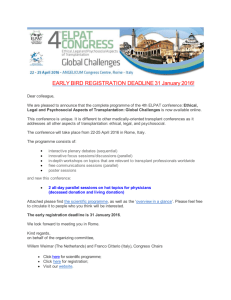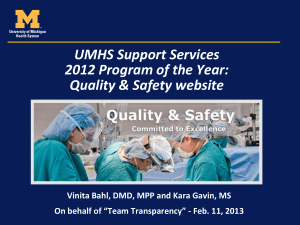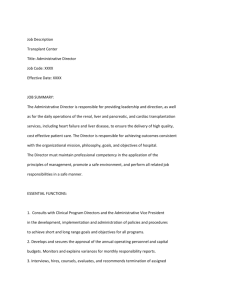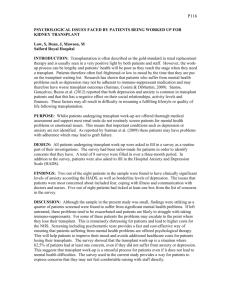consent to evaluate and list for kidney transplant
advertisement
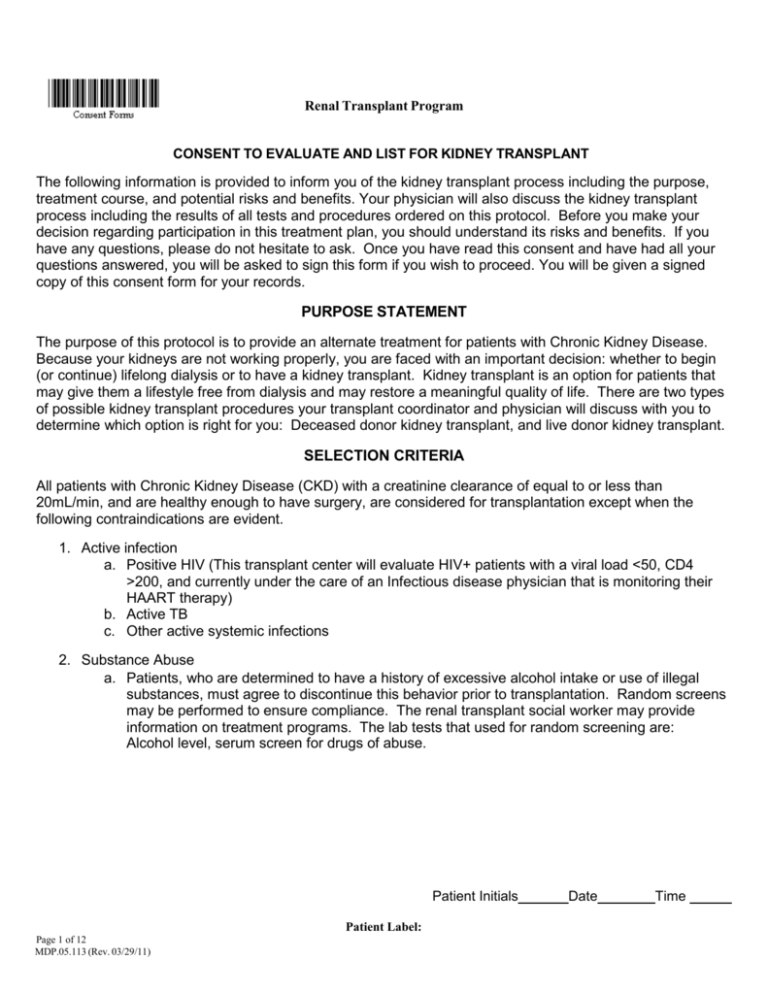
Renal Transplant Program CONSENT TO EVALUATE AND LIST FOR KIDNEY TRANSPLANT The following information is provided to inform you of the kidney transplant process including the purpose, treatment course, and potential risks and benefits. Your physician will also discuss the kidney transplant process including the results of all tests and procedures ordered on this protocol. Before you make your decision regarding participation in this treatment plan, you should understand its risks and benefits. If you have any questions, please do not hesitate to ask. Once you have read this consent and have had all your questions answered, you will be asked to sign this form if you wish to proceed. You will be given a signed copy of this consent form for your records. PURPOSE STATEMENT The purpose of this protocol is to provide an alternate treatment for patients with Chronic Kidney Disease. Because your kidneys are not working properly, you are faced with an important decision: whether to begin (or continue) lifelong dialysis or to have a kidney transplant. Kidney transplant is an option for patients that may give them a lifestyle free from dialysis and may restore a meaningful quality of life. There are two types of possible kidney transplant procedures your transplant coordinator and physician will discuss with you to determine which option is right for you: Deceased donor kidney transplant, and live donor kidney transplant. SELECTION CRITERIA All patients with Chronic Kidney Disease (CKD) with a creatinine clearance of equal to or less than 20mL/min, and are healthy enough to have surgery, are considered for transplantation except when the following contraindications are evident. 1. Active infection a. Positive HIV (This transplant center will evaluate HIV+ patients with a viral load <50, CD4 >200, and currently under the care of an Infectious disease physician that is monitoring their HAART therapy) b. Active TB c. Other active systemic infections 2. Substance Abuse a. Patients, who are determined to have a history of excessive alcohol intake or use of illegal substances, must agree to discontinue this behavior prior to transplantation. Random screens may be performed to ensure compliance. The renal transplant social worker may provide information on treatment programs. The lab tests that used for random screening are: Alcohol level, serum screen for drugs of abuse. Patient Initials Patient Label: Page 1 of 12 MDP.05.113 (Rev. 03/29/11) Date Time Renal Transplant Program CONSENT TO EVALUATE AND LIST FOR KIDNEY TRANSPLANT 3. Advanced Cardiopulmonary Disease a. Consultation with a XXX cardiologist is mandatory for anyone with a cardiac history, longstanding hypertension, age 50 and over, and all diabetics. 4. Malignancy a. No known current malignancy. This center may utilize the Israel Penn cancer registry for patients with past malignancies. 5. Active vasculitis/glomerulonephritis 6. Psychosocial a. Unable to comply with medical regimens b. No resource for medications c. Unable to care for self, lack of family support 7. Morbid Obesity a. BMI (body mass index) greater than 38 WAITING PERIOD There is no way to know when a deceased donor kidney will become available. There is a designation system in place to ensure those patients in need of a kidney transplant are given priority based on a variety of factors. This is managed by an organization called the United Network for Organ Sharing (UNOS). UNOS coordinates efforts among all the different transplant centers in the country to allocate donated organs for transplantation. Your position on the waiting list will depend on: Your Blood and Tissue type, formed antibodies, crossmatch and your wait time. The longer you’ve been on the waiting list, the better your chances will be of receiving the next suitable kidney. When you have been cleared by your physician for transplantation, you need to be ready to receive a transplant. At some point, you may become too sick to receive a transplant during the waiting period, this could be a temporary condition in which you can get better and receive a transplant. If your illness becomes a permanent condition where you would no longer be eligible to receive a donor kidney, this will be discussed with you at that time. When you become activated on the list and or if are removed from the list for any reason other than transplant or death, you will be notified of this change and reasoning for the change, in writing, within 10 business days of your status change. If you have a living donor, your wait time is significantly lower. The wait time will depend upon a suitable match and you and your donor’s clearance for surgery. Your transplant coordinator will also give you information on multiple listing. Multiple listing involves registering at two or more transplant centers in different areas. Since candidates at centers local to the donor hospital are usually considered ahead of those who are more distant, multiple listing may increase your chances of receiving a local organ offer. Patient Initials Patient Label: Page 2 of 12 MDP.05.113 (Rev. 03/29/11) Date Time Renal Transplant Program CONSENT TO EVALUATE AND LIST FOR KIDNEY TRANSPLANT EVALUATION AND PROCEDURES The initial evaluation will start with the transplant team: Transplant Coordinator: The nurse who does the initial screening and provides education and follow-up throughout your Pre and Post-transplant course. He or she will facilitate all aspects of the donation and transplantation process. Transplant Nephrologist: A physician who specializes in kidney disease. The Nephrologist will evaluate you for transplantation suitability and may make recommendations for further testing and or additional consultations. He or she will follow up with you throughout your transplant process. Transplant Surgeon: Will meet with you to discuss the potential risks and side effects of surgery. He or she will also make recommendations about your appropriateness as a potential transplant candidate. Social Worker: Will meet with you to assess your personal, psychosocial situation and possible stresses related to kidney transplantation. They will help you identify your support network and financial resources and plan for your recovery after transplantation. Financial Specialist: Will help you and your family deal with the financial burdens of a kidney transplant. This professional will explain what your insurance will and will not cover; help you determine if you qualify for coverage from Medicare, Medicaid or private insurance and direct you to available financial resources. Additional Consultations: May be required if the transplant team feels it is appropriate. Examples include; Psychologist (mental health), Registered Dietician (nutritional assessment or education), Pulmonologists (lung doctor), Cardiologist (heart doctor), or a Gastroenterologist/Hepatologist (GI doctor). Staff may also request a release of medical information from you during the evaluation to obtain additional information from other health care providers with whom you have a relationship. The initial evaluation, if possible, will be scheduled into one 8 hour day. However, many evaluations are separated into two visits. There are a number of tests that will be performed and repeated for anyone who is being considered for a kidney transplant. These evaluations reveal your overall health and help the transplant team determine if transplantation is right for you. Some or all of the following tests and possibly others may be required by your transplant team. Various Blood tests are done to determine your blood type and to look at matching between you and a potential donor. There are blood tests to assess the function of your kidneys and the status of your overall health. There will be blood tests to screen for immunity to or presence of specific viruses. The Panel Reactive Antibody (PRA) test is a way of measuring how active your immune system is. This level is usually higher when more antibodies are being made. It is easier to get a kidney when the immune system is calm or measures 0%. Patient Initials Patient Label: Page 3 of 12 MDP.05.113 (Rev. 03/29/11) Date Time Renal Transplant Program CONSENT TO EVALUATE AND LIST FOR KIDNEY TRANSPLANT You will also have an HIV or AIDS blood test. 1. AIDS, or Acquired Immune Deficiency Syndrome, is a disease that causes the body to lose its natural immunity to certain infections. 2. AIDS is caused by the HIV virus. The HIV virus can be transmitted from person to person through sexual contact, exposure to or sharing of contaminated intravenous needles and through exposure to infected blood or its components. Certain behaviors, including sharing drug needles, practicing unprotected sex (without a condom) or any exchange of infected blood, semen or vaginal fluids, increases a person’s risk of acquiring HIV. 3. When infected by a virus, the body produces substances called antibodies to fight off the infection. The blood test shows if you have antibodies to HIV, the virus that causes AIDS. 4. A screening test (called the ELISA test) will be performed on a sample of your blood. If that test shows that you have HIV antibodies, an additional confirmation test (called the Western Blot) will be done on the same blood sample to make sure the first test was correct. 5. The accuracy and reliability of the HIV test is uncertain. (HIV antibody testing is considered to be quite accurate but not 100%). A negative test means that you are probably not infected with the virus, but does not conclusively exclude the possibility of infection with the virus. A positive test usually means you have been exposed to the virus but does not mean you have AIDS or will develop AIDS in the future. In addition, false positives may occur. Your physician or designee will notify and explain the results to you. 6. State law requires positive HIV test results to be reported to the state Department of Health. X X X , to the best of its ability, will not disclose the results of these tests to others except to the extent required by law. Various radiologic tests will also be done. A chest X-ray will help identify any problems with your lungs. Imaging scans can show the size and shape of the kidneys and major blood vessels. Imaging scans that may be performed include: Abdominal ultrasound, Computerized axial tomography, and a Magnetic resonance imaging (MRI) when more detailed information is needed. An ECG will check for any abnormality of your heart rhythm or if you need additional cardiac testing. SURGICAL PROCEDURE Prior to your transplant, your surgeon will discuss the actual procedure and possible risks with you in detail. You will sign a separate consent for the kidney transplant surgical procedure immediately prior to transplantation. Kidney transplantation typically takes 2-3 hours. It is hard to definitely predict how long the operation will take, but your surgeon will update your family while surgery is in progress. Removing your nonfunctioning kidneys is usually not necessary unless there is a reason to do so. While you are under anesthesia, the surgeon connects the artery and vein of the new kidney to your artery and vein. This creates the blood flow through the kidney so it may function and make urine. The ureter, or the tube coming down from the donor kidney, is sewn into your bladder. Sometimes the new kidney will start working right away or it may take several days to weeks. There is a chance the kidney may never work. Patient Initials Patient Label: Page 4 of 12 MDP.05.113 (Rev. 03/29/11) Date Time Renal Transplant Program CONSENT TO EVALUATE AND LIST FOR KIDNEY TRANSPLANT RISKS There are inherent risks in all surgeries, especially surgeries conducted under general anesthesia, including the risk of death. Should complications occur they are usually minor and improve over time. In certain cases the complications are serious enough to require another surgery or medical procedure. We want to review some of the more serious types of complications. Organ Donor Risk Factors: Potential donors go through a rigorous screen process to ensure the organs are appropriate to be transplanted. Despite this process, donors are representative of the general public and may have risk factors that potentially could affect your long-term health, including but not limited to the donor’s history, age, or their potential risk of contracting the HIV virus and other infections that cannot be yet detected. High Risk Organ Donors: You may be offered a kidney from a donor who has been deemed “high risk for viral transmission” This type of donor had been identified by the Center for Disease Control (CDC) guideline as potentially being at high risk for transmitting HIV, the virus that causes AIDS. The following is a list of the reasons why a particular donor is deemed high risk. 1. Men who have had sex with another man in the preceding 5 years. 2. Persons who report nonmedical intravenous, intramuscular, or subcutaneous injection of drugs in the preceding 5 years. 3. Persons with hemophilia or related clotting disorders who have received human-derived clotting factor concentrates 4. Men and women who have engaged in sex in exchange for money or drugs in the preceding 5 years. 5. Persons who have had sex in the preceding 12 months with any person described in items 1-4 above or with a person known or suspected to have HIV infection. 6. Persons who have been exposed in the preceding 12 months to known or suspected HIV-infected blood through percutaneous inoculation or through contact with an open wound, non-intact skin, or mucous membrane. 7. Inmates of correctional systems. (This exclusion is to address issues such as difficulties with informed consent and increased prevalence of HIV in this population.) Patient Initials Patient Label: Page 5 of 12 MDP.05.113 (Rev. 03/29/11) Date Time Renal Transplant Program CONSENT TO EVALUATE AND LIST FOR KIDNEY TRANSPLANT 8. Persons whose history, physical examination, medical records, or autopsy reports reveal other evidence of HIV infection or high-risk behavior, such as a diagnosis of AIDS, unexplained weight loss, night sweats, blue or purple spots on the skin or mucous membranes typical of Kaposi's sarcoma, unexplained lymphadenopathy lasting greater than 1 month, unexplained temperature greater than 100.5 F (38.6 C) for greater than 10 days, unexplained persistent cough and shortness of breath, opportunistic infections, unexplained persistent diarrhea, male-to-male sexual contact, sexually transmitted diseases, or needle tracks or other signs of parenteral drug abuse. The transplant coordinator on call will identify the donor as high risk and discuss the donor history with you before you are asked to make a decision about accepting the organ for transplant. If you refuse the organ, it will not affect your status on the UNOS waitlist. Risk of Bleeding: Bleeding can occur during or after surgery. A bleeding episode may require blood transfusions or blood products that can contain bacteria and viruses that can cause infection. For this reason, we prefer your hemoglobin (blood count) from dialysis to be at 12 or a hematocrit of 40 prior to surgery to avoid needing blood transfusions after your surgery. Although rare, blood related infections include, but are not limited to the Human Immunodeficiency Virus (HIV), Hepatitis B Virus (HBV), and Hepatitis C Virus (HCV). Risk of Blood Clots: These can occur after the operation and can break free and occasionally move through the heart to the lungs. In the lungs they can cause serious interference with breathing and can lead to death. Clots may also move into the new transplanted kidney occlude the new blood flow. This may lead to the loss of the kidney. Blood clots are treated with blood thinning drugs and may need to be taken for an extended period of time. The clots in the kidney may require additional surgery for their removal in efforts to save the new transplant. Risk of Infection: Infections can occur when bacteria enter your body at the surgical incision site, or where there are any tubes to monitor your body functions (tubes to help you breathe, tubes to provide or remove fluids, tubes to monitor body functions). Infection can be at a specific site such as at your incision, in your lungs (pneumonia), or in your blood stream. Because your immune system is suppressed after surgery, these infections can even become life threatening. Risk of Rejection: This occurs when the body tries to destroy a transplanted organ or tissue because it is a foreign object. Immunosuppressive (anti-rejection) drugs help prevent rejection; however, rejection is always a possibility with a transplanted kidney. Risk to the Unborn: Because of the anti-rejection and other drugs you must take following a kidney transplant, it is not recommended female recipients become pregnant for the first year following transplant. After that time, please notify the transplant team prior to attempting to become pregnant so adjustments can be made to your medications to avoid birth defects to the unborn baby. Males who have had a transplant can father children. Patient Initials Patient Label: Page 6 of 12 MDP.05.113 (Rev. 03/29/11) Date Time Renal Transplant Program CONSENT TO EVALUATE AND LIST FOR KIDNEY TRANSPLANT Psychosocial Risks: Can occur as a result of kidney transplantation. These risks will be discussed during your evaluation with the transplant social worker. Other possible complications include injury to structures in the abdomen, pressure sores on the skin due to positioning, burns caused by the use of electrical equipment during surgery, damage to the arteries and veins, pneumonia, heart attack, stroke and permanent scarring at the site of the transplant incision. MEDICATIONS AFTER TRANSPLANT The following medications (listed with their potential side effects) will or may be used to treat or try to prevent rejection. You will remain on one or more of these medications for the remainder of your life. Tacrolimus (Prograf) or Cyclosporine - This medication will cause immune suppression with increased risk of infection and may also cause kidney and liver damage, headache, tremors in hands, an imbalance of sodium and potassium (electrolyte) levels, and high blood pressure. Mycophenolate (Myfortic) - This medication will cause immune suppression with increased risk of infection and may also cause low white blood cell counts, stomach upset, or diarrhea. Prednisone (Methylprednisolone) - These medications will cause immune suppression with increased risk of infection and may cause fluid retention, weight gain, high blood pressure, high blood sugar, increased appetite, mood changes, loss of calcium from bone (osteoporosis) with increased risk of broken bones, and erosion of the bone (bone damage). Diabetes or vision abnormalities (cataracts) are rare, but may occur. Valganciclovir HCL (Valcyte) - This is an anti-viral medication used to decrease your chance of getting sick from an infection caused by a virus called cytomegalovirus, or CMV. This drug is usually used the first 6 months post transplant. This medication can cause birth defects. You and your partner should not plan on becoming pregnant while either of you are on this medication. This medication may also cause you to have a low white blood cell count. Thymoglobulin or Simulect – These medications help prevent your body from rejecting the transplanted kidney. They are both given through an IV. You may receive one of these medications at the time of transplant. You may experience side effects such as: nausea, fever, headache, muscle aches. You will not go home on either of these medications. COMPLIANCE The treatment plan you receive from your physicians and nurses is based upon their experience plus ongoing review of the scientific literature related to care of kidney transplant patients. If you elect to change dosages or discontinue any or all of your immunosuppressive medications on your own, you will likely lose your transplanted kidney. Patient Initials Patient Label: Page 7 of 12 MDP.05.113 (Rev. 03/29/11) Date Time Renal Transplant Program CONSENT TO EVALUATE AND LIST FOR KIDNEY TRANSPLANT BENEFITS When the Kidney transplant is successful, you may experience improvement in your quality of life and a longer lifespan. Currently, according to SRTR, the Scientific Registry for Transplants, the national one year patient and graft survival rate for Kidney transplantation at XXX is as follows as of : National one year patient survival rate National one year graft survival rate Our Program one year patient survival rate Our program one year graft survival rate % % % % % % % % Additional data can be obtained via the UNOS website at www.unos.org ALTERNATIVES If you choose not to proceed with transplantation, you may continue dialysis and your current medical treatment plan. You may also choose to receive no treatment, in which case your physician will assist you in managing the discomforts and other effects of your disease. CONFIDENTIALITY We are required by law to maintain the privacy/confidentiality of your health information. All information obtained in connection with this procedure, which can be linked to you, will remain as confidential as possible within the requirements of state and federal law. The results of this procedure will be reviewed and may be published in a scientific journal or book without identifying you by name. Records will be kept regarding this procedure and will be made available for required reviews/audits by representatives of the Food and Drug Administration (FDA), members of the XXX’s kidney transplant program, members of the Kidney Transplant Research Database (SRTR), and members of the United Network for Organ Sharing (UNOS) under the guidelines established by the Federal Privacy Act. The reviewers/auditors may also have access to your medical records, which contain your identity; however they are required to maintain confidentiality. Your insurance company may also review your records. Patient Initials Patient Label: Page 8 of 12 MDP.05.113 (Rev. 03/29/11) Date Time Renal Transplant Program CONSENT TO EVALUATE AND LIST FOR KIDNEY TRANSPLANT LIABILITY AND COMPENSATION Adverse complications and outcomes are possible in any transplant procedure despite the use of high standards. Complications and outcomes we are aware of are described in this consent form. However, we are unable to predict all complications that may occur and could require care. Sometimes, despite all the best efforts by both you and the kidney transplant team, complications or unexpected outcomes occur. If you become sick or hurt because you received a transplant, the hospital and physicians will treat you. The hospital and physicians will also send the bill to you or your insurance company. You do not give up any of your legal rights by signing this form. By signing this form, you indicate you have been told about this procedure, your questions have been answered sufficiently, and you agree to proceed. You can obtain further information by calling the Kidney Transplant Office at 816-932-3550. SALE OF HUMAN ORGANS Sale or purchase of human organs is a federal crime and it is unlawful for any person to knowingly acquire, receive, or otherwise transfer any human organ for valuable consideration for use in human transplantation. Organ trafficking, more commonly known as Transplant Tourism, is simply defined as obtaining an organ outside of the legitimate rules and regulations covering transplantation in this country and abroad. It involves buying an organ. This usually happens in countries other than the United States. Sometimes patients from the United States go to these countries and obtain their transplant. As stated above, it is unlawful for any person to knowingly acquire, receive, or otherwise transfer any human organ for valuable consideration for use in human transplantation. If you obtain a transplant in this way, this program will not provide post-transplant care to you. VOLUNTARY PARTICIPATION Your participation is voluntary. You may choose not to participate or you may withdraw and be taken off the list at your request at any time without adversely affecting your relationship with your physicians and nurses. XXX meets all Center Medicare Services (CMS) criteria and is an approved Medicare heart and kidney transplant center. Notification of Medicare Outcome Requirements Not Being Met by Center Specific outcome requirements need to be XXX meets all of the requirements as a transplant center under CMS (Medicare). Patient Initials Patient Label: Page 9 of 12 MDP.05.113 (Rev. 03/29/11) Date Time Renal Transplant Program CONSENT TO EVALUATE AND LIST FOR KIDNEY TRANSPLANT Transplantation by a Transplant Center Not Approved by CMS (Medicare) If you receive a kidney transplant at a facility not approved by CMS ( Medicare) for transplantation, the ability to have your immunosuppressive drugs paid for under Medicare part B could be affected. Currently, XXX, meets all of the requirements as a transplant center under CMS (Medicare). Notification If Transplant Center Only Has One Surgeon If there is a time when there is only one transplant surgeon affiliated with the kidney transplant program, you will be notified by letter. Notification If Transplant Center Is Unable to Accept Organ Offers If there is a time when the kidney transplant program is unable to accept organ offers, all patients listed as Status 1 with UNOS will be notified by letter. AUTHORIZATION Your signature certifies you have decided to proceed, having read the information contained in the consent form, having received the educational material provided for you, and having had the risks and benefits explained to you, and having had all your questions answered. Upon signing this form, you will receive a copy. Patient Signature Date Time Transplant Nephrologist Signature Date Time Coordinator Signature Date Time Social Worker Date Time Surgeon Signature Date Time Signatures to be updated with each update. Patient Label: Page 10 of 12 MDP.05.113 (Rev. 03/29/11) Saint Luke’s Hospital Kansas City, MO 64111 Renal Transplant Program CONSENT TO EVALUATE AND LIST FOR KIDNEY TRANSPLANT Patient Signature Date Time Transplant Nephrologist Signature Date Time Coordinator Signature Date Time Social Worker Date Time Surgeon Signature Date Time Patient Signature Date Time Transplant Nephrologist Signature Date Time Coordinator Signature Date Time Social Worker Date Time Surgeon Signature Date Time Signatures to be updated with each update. Signatures to be updated with each update. Patient Label: Page 11 of 12 MDP.05.113 (Rev. 03/29/11) Saint Luke’s Hospital Kansas City, MO 64111 Renal Transplant Program CONSENT TO EVALUATE AND LIST FOR KIDNEY TRANSPLANT Patient Signature Date Time Transplant Nephrologist Signature Date Time Coordinator Signature Date Time Social Worker Date Time Surgeon Signature Date Time Patient Signature Date Time Transplant Nephrologist Signature Date Time Coordinator Signature Date Time Social Worker Date Time Surgeon Signature Date Time Signatures to be updated with each update. Signatures to be updated with each update. Patient Label: Page 12 of 12 MDP.05.113 (Rev. 03/29/11)

